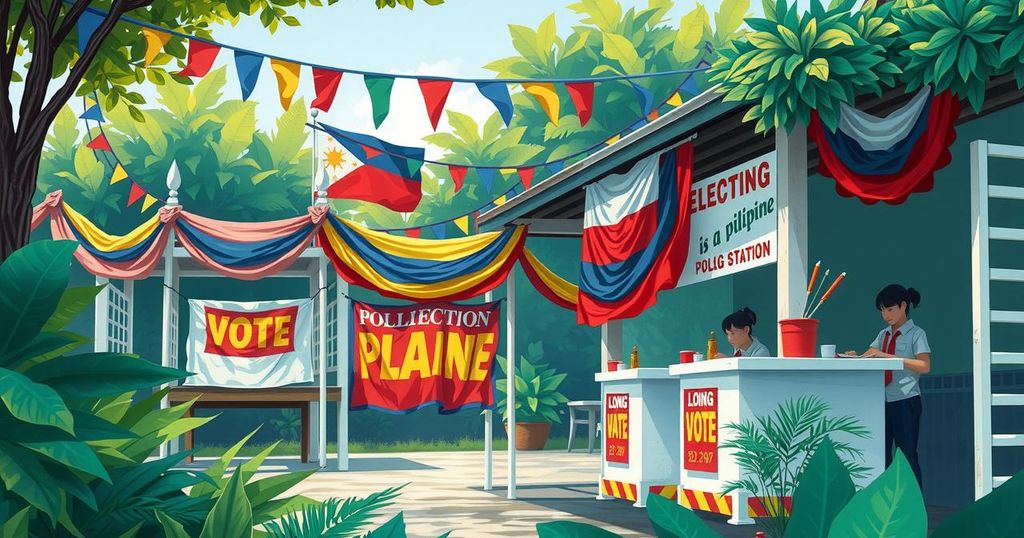Philippines Votes Amidst Marcos-Duterte Political Turmoil
Millions of Filipinos voted in a mid-term election seen as a referendum on the conflict between President Marcos and impeached Vice President Duterte. The Senate race is particularly crucial as it will impact a possible impeachment trial for Duterte. Violence marred the run-up to the elections, with multiple fatalities reported, highlighting the country’s turbulent electoral environment.
On Monday, millions of Filipinos took to the polls for a mid-term election that many analysts deemed a crucial referendum on the escalating feud between President Ferdinand Marcos and his impeached Vice President, Sara Duterte. Voting commenced at 7 a.m. local time (2300 GMT Sunday), with more than 18,000 positions at stake, ranging from seats in the House of Representatives to highly competitive municipal roles.
The Senate race stands out, as it will decide 12 senators who will fulfill a significant role in the government, particularly in a prospective impeachment trial for Duterte, set to tentatively occur in July. The importance of this election cannot be understated; the senators elected will form half of the jury in a trial that could result in Duterte being permanently barred from holding public office.
The feud between Duterte and former ally Marcos turned explosive in February when the House impeached her on serious accusations, including corruption and plotting against the president. Shortly thereafter, Duterte’s father, former president Rodrigo Duterte, was arrested and taken to the International Criminal Court (ICC) to address charges related to his controversial anti-drug campaign, a move that further intensified the ongoing political drama.
Election dynamics suggest that Sara Duterte is in a precarious position. She requires nine out of 24 Senate votes to maintain any chance of a future presidential bid. As of Monday, candidates favored by Marcos dominated the top of the polls, with seven backed by him and four supportive of Sara. Notably, his sister Imee Marcos and television figure Camille Villar were recently hailed as honorary members of the Duterte family’s PDP-Laban party, an effort to gather more support against the potential impeachment.
In her final rally in Manila last Thursday, Duterte raised alarms about potential “massive” electoral fraud while also labeling her father’s ICC transfer as a “kidnapping.” Despite facing legal challenges, Rodrigo Duterte remains on the ballot in Davao City, where he seeks to reclaim the mayoral position.
Tragically, the lead-up to the election has been marred by violence. Reports indicate at least two fatalities from clashes between opposing political factions in the autonomous Muslim region of Mindanao, with one local office citing four deaths. It is well-known that the Philippines has a troubled electoral history filled with violence, especially in its southern regions.
National police have been highly vigilant leading up to the elections, deploying approximately 163,000 officers to ensure polling station security and manage checkpoints. Additional personnel from the military and other agencies have joined the effort to maintain order as the atmosphere remains tense over contested provincial positions. Furthermore, the lead-up to the polls saw 16 individuals, including a hopeful city council member and a polling officer, killed in violence linked to the elections.
In an interesting turn, law enforcement also arrested a group at Cebu airport who were found carrying nearly $8 million in cash, an act against election rules designed to curb vote-buying. Concurrently, for the first time this year, a special early voting option was made available for the elderly and individuals with disabilities, allowing them to cast their ballots as early as 5 a.m.
This election day in the Philippines reveals a landscape filled with political tension, interpersonal conflicts, and the shadow of violence, leaving many citizens to ponder the future direction of their country.
The mid-term election in the Philippines highlights the intense rivalry between President Marcos and Vice President Duterte amid serious allegations, including impeachment threats. Violence leading up to the polling day underscores the country’s tumultuous electoral saga, while the outcome may significantly influence the future presidential race. With considerable public participation seen in the vote, the results will reveal the electorate’s stance on the prevailing political dynamics.
Original Source: www.rfi.fr




Post Comment